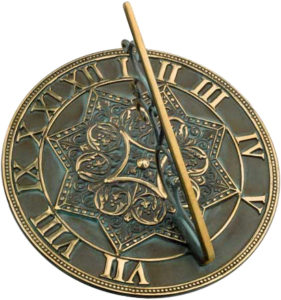The Dial
The Dial was composed by Lancelot Andrewes (1555-1626).
Thou who hast put the times and seasons in thine own power;
grant that we make our prayer unto Thee in a time convenient and when Thou mayest be found,
and save us.
Thou who for us men and for our salvation wast born at dead of night;
give us daily to be born again by renewing of the Holy Ghost, till Christ be formed in us unto a perfect man,
and save us.
Thou who very early in the morning while the sun was yet arising didst rise from the dead:
raise us up daily unto newness of life, suggesting to us ways of repentance which Thyself knowest,
and save us.
Thou who at the third hour didst send down the Holy Ghost on the apostles;
take not away the same Spirit from us, but renew Him daily within us,
and save us.
Thou who at the sixth hour and on the sixth day didst nail the sins of the world with Thyself on the Cross:
blot out the handwriting of our sins which is against us and taking it out of the way,
and save us.
Thou who at the sixth hour didst let down a great sheet from heaven to earth, a figure of thy Church:
receive us up into it, sinners of the Gentiles, and with it receive us up together into heaven,
and save us.
Thou who at the seventh hour didst will that the fever should leave the nobleman’s son:
if aught abide of fever or sickness in our soul, take it away from us also,
and save us.
Thou who at the ninth hour for us sinners and for our sins didst taste of death:
mortify in us our earthly members and whatsoever is contrary to they will,
and save us.
Thou who hast willed the ninth hour to be an hour of prayer:
hear us while we pray in the hour of prayer and make us to obtain our prayer and our desires,
and save us.
Thou who at the tenth hour didst will thine apostle, whenas he found thy Son, to declare with great joy “We have found the Messias”:
make us also in like sort to find the Messias and when He is found in like sort to rejoice,
and save us.
Thou who at eventide didst will to be taken down from the cross and buried in a tomb:
take away our sins from us and bury them in thy sepulcher, covering with good works whatsoever we have committed ill,
and save us.
Thou who didst vouchsafe even at the eleventh hour of the day to send men into thy vineyard and to fix a wage, notwithstanding they had stood all the day idle;
do unto us like favour and, though it be late, as it were about the eleventh hour, accept us graciously when we return to Thee,
and save us.
Thou who at the hour of supper didst will to institute the most sacred mysteries of they body and blood:
make us mindful of the same and partakers thereof, and that, never unto judgment but unto remission of sin and unto acquiring of the bequests of the new testament,
and save us
Thou who late in the night didst by thy breathing confer on thine apostles the authority as well to forgive as to retain sins:
make us partakers of that authority, yet that it be unto remission, not unto retention, o Lord,
and save us.
Thou who at midnight didst awaken David thy prophet and Paul the apostle to praise thee:
give us also songs by night and to remember Thee upon our beds,
and save us.
Thou who with thine own mouth hast avouched that at midnight the Bridegroom shall come:
grant that the cry “The Bridegroom cometh” may sound evermore in our ears, that so we be never unprepared to meet Him.
and save us.
Thou who by the crowing of a cock didst admonish thine apostle and make him to return to penitence:
grant us also at the same admonition to do the same, to wit go forth and weep bitterly the things wherin we have sinned against Thee,
and save us.
Thou who hast foretold that Thou will come to judgment in a day when we look not for Thee and at an hour when we are not aware:
make us prepared every day and every hour to be ready for thine advent.
and save us.
Amen.
(source: For All The Saints, 766-770)
Lancelot Andrewes was a learned preacher, patristic scholar, expert in fifteen languages, including Syriac and Chaldee, a translator of much of the Pentateuch and the historical books of the Old Testament in the Authorized King James’ Version of the Bible. Born in London in 1555, Andrewes was educated at Cambridge. Ordained in 1580, he became Dean of Westminster in 1601. He twice refused a bishopric but at length was persuaded by King James I to accept the see of Chichester in 1605. He was transferred to Ely in 1609 and to Winchester in 1619. He died September 25, 1626, and is buried in Southwark Cathedral. (Pfatteicher, New Book of Festivals & Commemorations, 469)

